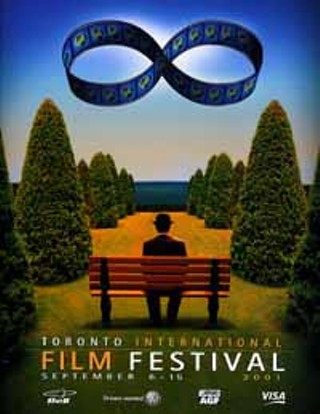Two Weeks in Another Town
Notes From the Toronto International Film Festival
By Marjorie Baumgarten, Fri., Sept. 21, 2001

The Toronto International Film Festival is the biggest and, arguably, the most important annual film festival on the North American continent. With 326 films from 54 countries screening during the 2001 festival held September 6-15, the event is one of the best places to view offerings from around the world and preview some of the upcoming Hollywood and American indie fall product.
One can come away from the festival with a good sense of what's looming on the movie horizon, even though it's physically possible to see only a mere fraction of the available choices. For 10 days, the air is thick with movies. Attendees represent a wide mixture of avid Canadian filmgoers, industry figures, and international journalists. Movies (and coffee) are the fuel that makes them run.
This year's festival can only be described as belonging in two parts: before and after. The terrorist attacks of September 11 occurred at exactly the halfway point in the festival. Ritual festivities and a celebratory mood suddenly gave way to the same shock and disbelief that overtook the rest of the world. An international film community huddled together for comfort and information as visitors to Toronto scrambled to contact loved ones and cope with the realization that they were now stranded without transportation back home.
By midday Tuesday, festival organizers had canceled the remainder of the day's screenings and all official parties and red-carpet events. Screenings resumed on Wednesday, and most of the canceled screenings were rescheduled for later in the week, although the festivities and fanfare surrounding the movies were no longer possible. There is no way to talk about this year's festival without discussing the impact world events had on the affair. What is fascinating, however, is not the way in which events affected individuals dealing with the tragedy while far from home or as they emerged from their 8:30am screenings Tuesday to receive the news, or even how the festival dealt with the embargo on the shipment of film prints, the sudden unavailability of guests and films scheduled for the second half, and the convoluted task of rescheduling programs and disseminating information (although it should be noted that festival organizers and the Internet performed to their fullest potential).
Instead, what is fascinating is how the horror humbled everyone into examining the value of what it is they do, and to consider the sudden irrelevance of film entertainment. As people everywhere watched and re-watched the video of the attacks, the oft-repeated refrain was "It's just like a movie." In the midst of one of the world's greatest film festivals, these words carried an incalculable weight. It remains to be seen if the horror will have the long-term effect of making bad movies seem even more irrelevant than before and making us cherish good movies even more. The one thing we now know is that the lines between good and bad have never been more starkly defined.
A film that I had earlier applauded in my report from this year's Sundance Film Festival and that was also screening in Toronto gained an extra urgency from the week's events. That movie is Richard Linklater's animated feature Waking Life, which stars Linklater's doppelganger Wiley Wiggins (also the star of Dazed and Confused) in a roundabout search for life's answers and meaning. This visually and formally inventive movie has a philosophical purity that makes it even more articulate amid the current climate of inexpressive disbelief. Already hailed in both local weeklies upon my arrival in Toronto (Now featured the film on both its issue cover and festival pullout, while Eye awarded the film a five-star recommendation), Linklater was also singled out for his presentation of two films in the festival. Also screening was Tape, Linklater's first digital project, a searing drama and fascinating exercise featuring only three actors (Ethan Hawke, Uma Thurman, and Robert Sean Leonard) and one set. Tape is due to open in November following the October 24 release (Austin opening date) of Waking Life (also scheduled for an Austin Film Society and the Austin Film Festival benefit premiere on October 14).
Among other Austin filmmakers, there was also a strong showing in Toronto. Guillermo del Toro's effective new ghost tale The Devil's Backbone, set in an orphanage during the waning months of the Spanish Civil War, has proved a hit on the fall festival circuit and in Spain, where it was filmed and already opened last spring. It is due to hit U.S. theatres in November. Former Austinite and SXSW Film award-winner George Ratliff (Plutonium Circus) was represented in the festival by his new documentary Hell House, a stirring investigation of a Halloween spookhouse annually sponsored by an evangelical Christian church in Dallas. Other SXSW favorites from this year's festival were also screened in Toronto: Bradley Beesley's award-winning Okie Noodling and Michener Center alum Arthur Bradford's unconventional documentary How's Your News? (Coincidentally, the multitalented Bradford will be in Austin this week promoting his new book, Dogwalker. See "Arthur the Absurdist," p. 33.)
Most of all, during the last half of my stay in Toronto, I found words by the recently deceased critic Pauline Kael echoing in my head. Like the rest of us, Kael could not have envisioned the present tragedy when she wrote the essay "Trash, Art and the Movies," but the following sentiments strike me now as more true than ever: "A good movie can take you out of your dull funk and the hopelessness that so often goes with slipping into a theater; a good movie can make you feel alive again, in contact, not just lost in another city. Good movies make you care, make you believe in possibilities again." It is with this sense of hope that we must now gather together in the dark. ![]()












